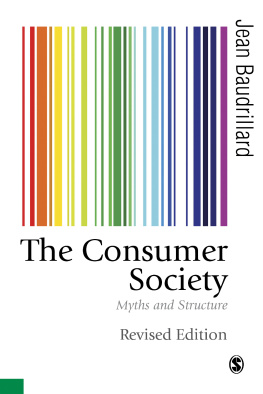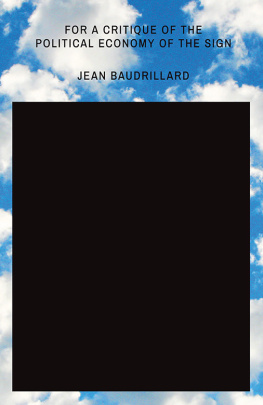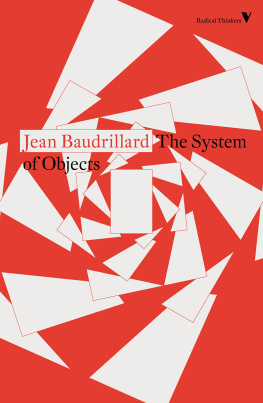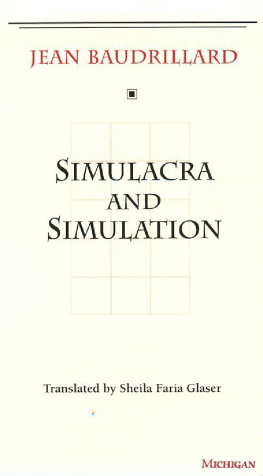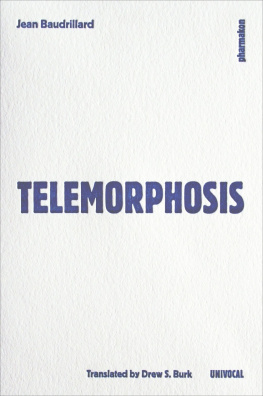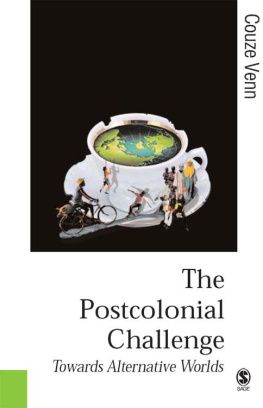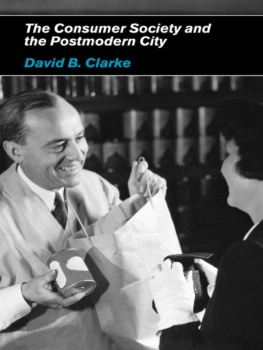The Consumer Society
The Consumer Society
Myths and Structures
Theory, Culture & Society
Revised Edition
SAGE Publications Ltd
1 Olivers Yard
55 City Road
London EC1Y 1SP
SAGE Publications Inc.
2455 Teller Road
Thousand Oaks, California 91320
SAGE Publications India Pvt Ltd
B 1/I 1 Mohan Cooperative Industrial Area
Mathura Road
New Delhi 110 044
SAGE Publications Asia-Pacific Pte Ltd
3 Church Street
#10-04 Samsung Hub
Singapore 049483
English translation copyright Sage Publications 1998
Introduction George Ritzer 1998
Introduction Barry Smart 2017
Originally published as La socit de consommation Editions Denol 1970
This edition first published 1998. Reprinted 1999
This revised edition published 2017
This translation is published with financial support from the French Ministry of Culture
Published in association with Theory, Culture & Society , Goldsmiths, University of London
Apart from any fair dealing for the purposes of research or private study, or criticism or review, as permitted under the Copyright, Designs and Patents Act, 1988, this publication may be reproduced, stored or transmitted in any form, or by any means, only with the prior permission in writing of the publishers, or in the case of reprographic reproduction, in accordance with the terms of licences issued by the Copyright Licensing Agency. Enquiries concerning reproduction outside those terms should be sent to the publishers.
Library of Congress Control Number: 2016955372
British Library Cataloguing in Publication data
A catalogue record for this book is available from the British Library
ISBN 978-1-4739-0759-1
ISBN 978-1-4739-0758-4 (pbk)
Editor: Natalie Aguilera
Editorial assistant: Delayna Spencer
Production editor: Rachel Burrows
Marketing manager: Sally Ransom
Cover design: Wendy Scott
Typeset by: C&M Digitals (P) Ltd, Chennai, India
Printed in the UK
Shower him with all earthly blessings, plunge him so deep into happiness that nothing is visible but the bubbles rising to the surface of his happiness, as if it were water; give him such economic prosperity that he will have nothing left to do but sleep, eat gingerbread, and worry about the continuance of world history.
Fyodor Dostoyevsky, Notes from Underground
Contents
Foreword
Jean Baudrillards book The Consumer Society is a masterful contribution to contemporary sociology. It certainly has its place in the tradition which includes Durkheims The Division of Labour in Society, Veblens Theory of the Leisure Class and David Riesmans The Lonely Crowd.
Baudrillard analyses our contemporary Western societies, including that of the United States. This analysis focuses on the phenomenon of the consumption of objects which he has already tackled in The System of Objects (Gallimard, 1968; translation, Verso, 1996). In his conclusion to that volume, he formulates the plan of the present work: It has to be made clear from the outset that consumption is an active form of relationship (not only to objects, but also to society and to the world), a mode of systematic activity and global response which founds our entire cultural system.
He shows with great perspicacity how the giant technocratic corporations foster irrepressible desires, creating new social hierarchies which have replaced the old class differences.
A new mythology has arisen in this way. As Baudrillard writes,
The washing machine serves as an appliance and acts as an element of prestige, comfort, etc. It is strictly this latter field which is the field of consumption. All kinds of other objects may be substituted here for the washing machine as signifying element. In the logic of signs, as in that of symbols, objects are no longer linked in any sense to a definite function or need. Precisely because they are responding here to something quite different, which is either the social logic or the logic of desire, for which they function as a shifting and unconscious field of signification.
Consumption, as a new tribal myth, has become the morality of our present world. It is currently destroying the foundations of the human being, that is to say, the balance which European thought has maintained since the Greeks between our mythological roots and the world of the logos. Baudrillard is aware of the risk we are running. Let us quote him once again:
Just as medieval society was balanced on God and the Devil, so ours is balanced on consumption and its denunciation. Though at least around the Devil heresies and black magic sects could organize. Our magic is white. No heresy is possible any longer in a state of affluence. It is the prophylactic whiteness of a saturated society, a society with no history and no dizzying heights, a society with no myth other than itself.
The Consumer Society, written in a concise style, should be carefully studied by the younger generation. Perhaps they will take up the mission of breaking up this monstrous, if not indeed obscene, world of the abundance of objects so formidably sustained by the mass media and particularly by television, this world which threatens us all.
J.P. Mayer
University of Reading
Translators Acknowledgements
I would like to thank Marie-Dominique Maison, Leslie Hill, Mike Gane and Glynis Powell for various forms of linguistic assistance with this translation. Thanks are also due to Richard G. Smith for providing some invaluable background information.
For reasons of style, the author has made some very minor changes to the original text. I have personally taken the liberty of numbering the chapters.
C.T.
About the Authors of the Introductions
Barry Smart
is Professor of Sociology at the University of Portsmouth, England. His books in the field of social theory include Sociology, Phenomenology and Marxian Analysis (1976: 2014); Foucault, Marxism and Critique (1983: 2009); Modern Conditions, Postmodern Controversies (1992); Facing Modernity (1999); and Economy, Culture and Society: A Sociological Critique of Neo-liberalism (2003). Other books include The Sport Star: Modern Sport and the Cultural Economy of Sporting Celebrity (2005); and Consumer Society: Critical Issues and Environmental Consequences (2010). He is the editor of Michel Foucault: Critical Assessments I and II (1994: 1995), Resisting McDonaldization (1999), and Post-Industrial Society (2011) and is co-editor of the Handbook of Social Theory (2001 with George Ritzer) and Observation Methods (2013 with Kay Peggs and Joseph Burridge).
George Ritzer,
Distinguished University Professor at the University of Maryland, was named a Distinguished Scholar-Teacher there and received the ASA's Distinguished Contribution to Teaching Award. He holds an Honorary Doctorate from La Trobe University and the Robin William Lectureship from the Eastern Sociological Society. He has chaired four Sections of the ASA: Theoretical Sociology, Organizations and Occupations, Global and Transnational Sociology, and the History of Sociology. Among his books in theory are Sociology: A Multiple Paradigm Science (1975/1980) and Metatheorizing in Sociology (1991). In the application of social theory to the social world, his books include The McDonaldization of Society (8th edn, 2015), Enchanting a Disenchanted World (3rd edn, 2010), and The Globalization of Nothing (2nd edn, 2007). His books have been translated into over twenty languages, with over a dozen translations of The McDonaldization of Society alone. Most of his work over the last decade, and currently, deals with prosumption.





